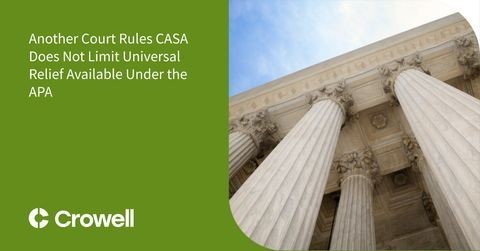Waiver of Eleventh Amendment Sovereign Immunity Does Not Extend To Subsequent Action Following Voluntary Dismissal
Client Alert | 1 min read | 10.26.07
In Biomedical Patent Management Corporation v. State of California, Department of Health Services (“DHS”)(No. 2006-1515, October 23, 2007), the Federal Circuit affirms a district court’s ruling that a waiver of Eleventh Amendment sovereign immunity does not extend to subsequently filed actions, despite the fact that the later-filed actions may involve the same parties and the same subject matter.
Before the district court, DHS voluntarily intervened in an action in which one of its subcontractors filed for a declaratory judgment of noninfringement against Biomedical Patent Management Corporation (“BPMC”). Due to the potential impact of the Supreme Court’s then-pending decision in Florida Prepaid Postsecondary Educ. Expense Bd. v. Coll. Sav. Bank, 527 U.S. 627 (1999)(“FloridaPrepaid”) on the issue of state sovereignty, the district court dismissed the case following a voluntary request by BPMC. In a renewed action brought by BPMC after the FloridaPrepaid decision, DHS moved to dismiss the renewed action on the ground that sovereign immunity under the Eleventh Amendment barred BPMC’s claims. BPMC countered, arguing that DHS’ initial waiver of its Eleventh Amendment rights by voluntarily intervening in the original suit carries over to the later action and judicially estops DHS from now asserting immunity.
In affirming the district court’s holding, the Federal circuit panel relies in part on Ninth Circuit precedent for the proposition that a voluntary dismissal leaves the situation as if the action had never been filed. As such, DHS’ initial waiver of its Eleventh Amendment sovereign immunity does not extend to the subsequently-filed case, despite the fact that the later-filed case involves the same parties and the same subject matter. In also rejecting BPMC’s claim that DHS is now judicially estopped from asserting its Eleventh Amendment sovereign immunity, the Federal Circuit notes that the intervening change in law brought about by the Supreme Court’s decision in FloridaPrepaid renders DHS’ differing positions on its sovereign immunity rights not wholly inconsistent.
Insights
Client Alert | 3 min read | 01.05.26
Another Court Rules CASA Does Not Limit Universal Relief Available Under the APA
In Trump v. CASA, the Supreme Court significantly constrained the equitable authority of federal district courts to grant universal or nationwide injunctive relief, clarifying that, with specific exceptions, a federal court’s power to grant relief is limited to the parties before it. When it was issued, many bemoaned CASA’s implications for preventing government overreach.
Client Alert | 7 min read | 01.05.26
Consideration of Artificial Intelligence in Arbitration Terms of Reference
Client Alert | 4 min read | 12.31.25
Raising the Bar: New York Expands Consumer Protection Law with FAIR Business Practices Act
Client Alert | 4 min read | 12.30.25


